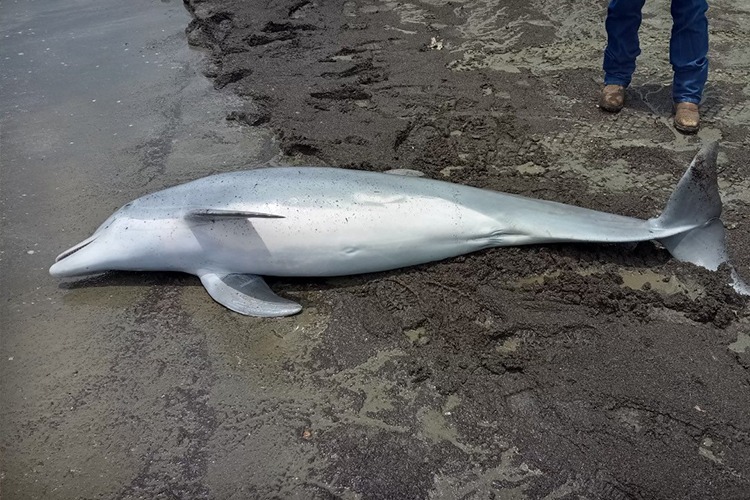A dolphin was tragically found shot to death on a Louisiana beach, leading the National Oceanic and Atmospheric Administration (NOAA) to offer a $20,000 reward for information on identifying the perpetrator responsible for this heinous act. The juvenile bottlenose dolphin was discovered on West Mae’s Beach in Cameron Parish, Louisiana on March 14. Following the discovery, NOAA’s stranding network partner, Audubon Aquarium Rescue, recovered the dolphin and sent it to the Audubon Nature Institute in New Orleans for a necropsy. The results of the necropsy revealed that multiple bullets were lodged in the dolphin’s brain, spinal cord, and heart, causing its untimely demise. The trauma leading to the dolphin’s death was determined to have occurred at or near the time of death.
The NOAA’s Office of Law Enforcement has taken on the case and is actively investigating the circumstances surrounding the dolphin’s death. In order to encourage individuals to come forward with any relevant information, the agency is offering a substantial reward for any details that lead to the arrest and conviction of the individual responsible for harming the dolphin. Harassing, harming, killing, or feeding wild dolphins is strictly prohibited under the Marine Mammal Protection Act. Those found in violation of this law may face fines of up to $100,000 and even jail time. The senseless act of harming a wild dolphin not only goes against federal regulations but also shows a complete lack of regard for the well-being of these intelligent and sensitive creatures.
The death of the bottlenose dolphin in Louisiana highlights the ongoing issue of wildlife crime and the need for stricter enforcement of existing laws to protect marine mammals. Dolphins are highly intelligent and social animals that play a crucial role in marine ecosystems. The deliberate harm caused to this dolphin is not only a violation of federal laws but also a moral outrage that must be addressed through swift and appropriate legal action. The reward offered by NOAA serves as a strong incentive for members of the public to come forward with any information that may help identify the perpetrator and bring them to justice.
The dolphin’s tragic death also serves as a reminder of the importance of conservation efforts to protect marine wildlife and their habitats. The Marine Mammal Protection Act was enacted to safeguard marine mammals from harm and ensure their long-term survival in the wild. The illegal killing of dolphins threatens the population of these animals and disrupts the balance of marine ecosystems. By raising awareness of the severe consequences of harming marine wildlife, NOAA hopes to deter further incidents of wildlife crime and promote a culture of respect and conservation for these vulnerable species.
In conclusion, the brutal killing of a bottlenose dolphin in Louisiana has sparked outrage and concern among wildlife conservationists and the public. NOAA’s offer of a $20,000 reward for information leading to the arrest and conviction of the individual responsible for this act reflects the agency’s commitment to upholding federal laws protecting marine mammals. The case serves as a sobering reminder of the threats faced by marine wildlife and the urgent need for stricter enforcement of conservation laws. Dolphins, as highly intelligent and social animals, play a vital role in ocean ecosystems, and their protection is essential for maintaining the health of marine environments. By working together to combat wildlife crime and hold offenders accountable, we can ensure a safer and more sustainable future for marine wildlife.















